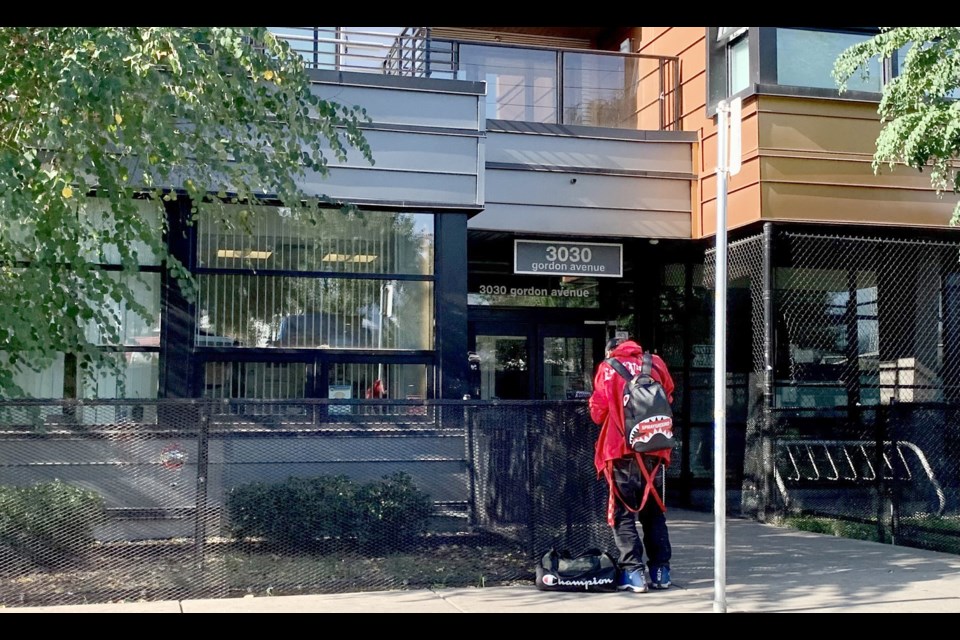A group that finds solutions to Tri-Cities homelessness met today, Sept. 8 to sharpen its mandate.
Stakeholders with the Tri-Cities Homelessness and Housing Task Group were in Coquitlam for an all-day strategic planning workshop Friday to brainstorm about how the organization can better respond to the people living at the Tri-Cities' only homelessness shelter at 3030 Gordon Ave., as well as those living on the streets and in the woods.
Among the 50 stakeholders were:
- Port Coquitlam Mayor Brad West
- Daniele Hurley, associate director of RainCity Housing that runs 3030 Gordon
- Claire MacLean, CEO of SHARE Family and Community Services
- representatives from Fraser Health, RCMP, BC Housing, Phoenix Society, Trinity United Church, ACCESS Youth Outreach Services and local civic governments
Facilitated by Urban Matters at the Poirier Sport and Leisure Complex, the gathering focused on redefining values, roles and responsibilities for the task group as it moves forward in a post–pandemic housing and toxic drug crisis that’s happening across Canada.
The meeting comes two weeks after the provincial government publicly released a review of 3030 Gordon, which opened in 2015 to provide:
- transitional housing for 30 people
- emergency shelter for 30 people
- temporary shelter for up to 15 people
According to the report, most people staying at the facility have not moved out — largely because there is no affordable or subsidized housing in the area, or because of severe mental health or drug addictions of which RainCity does not have the resources to handle.
The report makes 17 recommendations for RainCity, seven for community service/support groups and two for BC Housing, RainCity and the Tri-Cities combined on housing options.
Ask for Tri-Cities PACT
Friday's task group meeting also comes three days before Coquitlam's council-in-committee is expected to call on the province for a Tri-Cities PACT that, if implemented, would add a new level of support for mental health care and crisis management locally.
This year, the province — under Premier David Eby's Safer Communities Action Plan roll-out — asked the Canadian Mental Health Association (CMHA) to gather information so it could pick which B.C. communities could get a Peer Assisted Care Team (PACT).
In her report that will go before council-in-committee on Monday, Sept. 11, Michelle Hunt, Coquitlam's deputy city manager, wrote that the PACT will be made up of two employees of a local non-profit serve provider "with experience providing culturally safe and trauma-informed responses to people experiencing mental health and/or substance use crises."
Currently, PACTs are operating in New Westminster, the North Shore and Victoria. and, under the provincial program, they will transition to a 24/7 model. Prince George, Kamloops and Comox Valley will be the next communities to receive a PACT.
"This leaves four recipients who will be announced by the Province in the fall/winter of 2023, for a total of 10 PACTs in B.C.," Hunt wrote.
"Coquitlam council has been an advocate for increased mental health supports in the community for several years."
Coquitlam will be the lead for the Tri-Cities on the PACT pitch to Jennifer Whiteside, an MLA for New Westminster and BC’s minster of mental health and additions, Hunt wrote.
Meanwhile, the government intervention comes as six Tri-Cities churches ready for another round of hosting winter shelters for the homeless, from Oct. 1, 2023 to March 31, 2024. They are:
- St. Laurence Anglican Church (825 St. Laurence St., Coquitlam)
- Eagle Ridge Bible Fellowship (1160 Lansdowne Dr., Coquitlam)
- Trinity United Church (2211 Prairie Ave., Port Coquitlam)
- Calvary Baptist Church (1636 Regan Ave., Coquitlam)
- Coquitlam Alliance Church (2601 Spuraway Ave., Coquitlam
The nightly shelters will be run again by the Progressive Housing Society.
📣 SOUND OFF: What do you think about the homelessness crisis in the Tri-Cities? Send us your comments for publication via [email protected].





